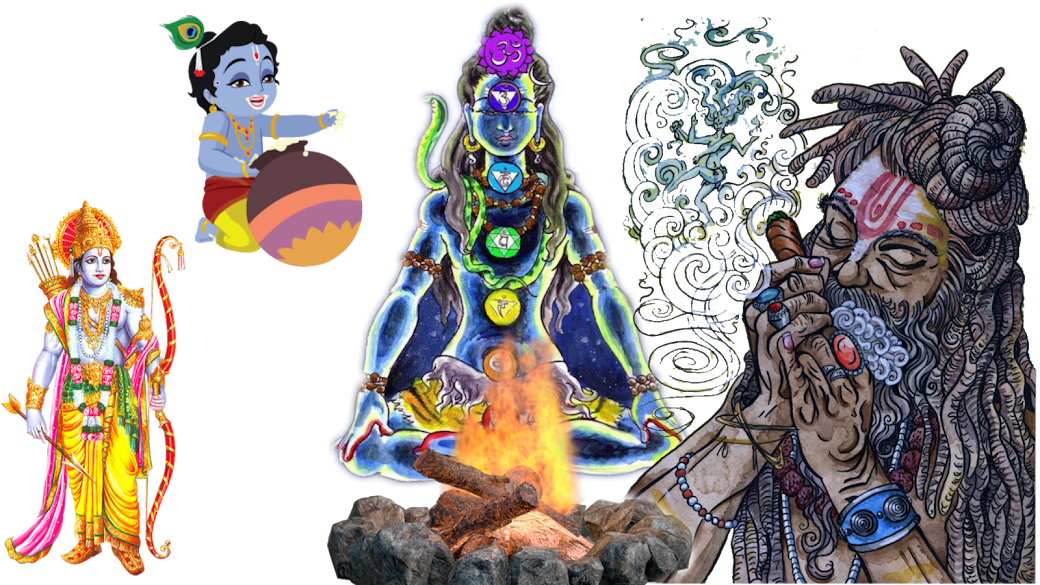LORD INDRA
In Vedic times, Indra was the supreme ruler of the gods. He was the leader of the Devas, the god of war, the god of thunder and storms, the greatest of all warriors, the strongest of all beings. He was the defender of gods and mankind against the forces of evil. He had early aspects of a sun-god, riding in a golden chariot across the heavens, but he is more often known as the god of thunder, wielding the celestial weapon Vajra, the lightening bolt. He also employs the bow, a net, and a hook in battle. He shows aspects of being a creater god, having set order to the cosmos, and since he was the one who brought water to earth, he was a fertility god as well. He also had the power to revive slain warriors who had fallen in battle.
Indra is described as being very powerful, with a reddish complexion, and with either two or four very long arms. His parents were the sky god Dyaus Pita and the earth goddess Prthivi; he was born fully grown and fully armed from his mother's side. His wife was Indrani, and his attendants were called the Maruts. His sons are named as Jayanta, Midhusa, Nilambara, Rbhus, Rsabha, Sitragupta, and, most importantly, Arjuna. More hymns in the Rig Veda (about 250) are dedicated to him than any other god by a sizable amount. He was known as a great drinker of Soma; sometimes he did this to draw strength, and when he did he grew to gigantic proportions to battle his enemies, but more often he merely wanted to get drunk. When not in his chariot, Indra rode on the great white elephant Airavata, who was always victorious, and who had four tusks which resembled a sacred mountain. He was given numerous titles including Sakra ("Powerful"), Vajri ("the Thunderer"), Purandara ("Destroyer of Cities"), Meghavahana ("Rider of the Clouds"), and Svargapati ("the Lord of Heaven").
Indra held court at Svarga, his heaven in the clouds surrounding the highest peak of the sacred mountain Meru. This heaven could move anywhere at its lord's command. In Svarga, there is an enormous hall when slain warriors went after death. Indra and the beautiful Indrani presided over their paradise. No sorrow, suffering, or fear were allowed in Indra's home. Apsaras and Gandharvas danced and entertained those who attended court, and gaming and athletic contests were held.
Indra's most notable exploit was his battle with the asura Vritra. Vritra took the form of a mighty dragon, and had stolen all the water in the world for himself. No one could do anything about this until Indra was born. Upon hearing what had happened, Indra vowed to take back the life-giving liquid. He rode forth to meet him the terrible Vritra. He consumed great amounts of Soma to give him the strength needed to fight such a foe. Indra smashed through Vritra ninety-nine fortresses, and then came upon the dragon. The two clashed, and after a long battle Indra was able to destroy his powerful enemy. Vritra had been keeping the earth in a drought, but when Indra split open the demon, the waters again fell from the skies. So Indra became a hero to all people, and the gods elected him their king for his victory.
In Brahamanic and later times, Indra slowly lost much of his grandeur. He was supplanted by Vishnu and Shiva as the most important of gods. In later versions of the story of his battle against Vritra, he is portrayed as vengeful and cowardly, and needs the help of Shiva and Vishnu to slay the dragon. In the Mahabharata, Indra is pursued by a terrible female goddess called only Brahminicide who rose up out of the dead Vritra, who was a Brahman in that version of the story. She relentlessly chased him and overtook him in his chariot and clung to him so that he could not escape; he hid inside a lotus blossom, but he still could not dislodge her. Finally, he went before Brahma and acknowledged his crime, for the killing of a Brahman was considered a terrible sin, and Brahma agreed to help him become free. The king of the gods had to perform penance to atone for his transgression. Indra also suffered such indignities as Krishna showing himself to be immune to Indra's storm and supplanted himself onto Indra's worshipers.
Indra eventually was given the role of weather god and lord of the lesser gods.
 |
Hindu God Indra Nepal Kathmandu Valley 16th century gilt bronze with gemstones |
 |
Indra-the god of rain and thunder storm |
 |
The Hindu God Indra, Vientiane. |
 |
Hindu God Indra Elephant Cast Iron |
 |
Indra - God of Rain & Thunder. Top 10 Most Powerful Hindu Gods/Lords |
 |
Indra-the god of rain and thunder storm |
 |
indra and airavat |





No comments:
Post a Comment